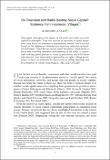Do Television and Radio Destroy Social Capital? Evidence from Indonesian Villages
Author(s)
Olken, Benjamin A.
DownloadOlken_Do television.pdf (488.0Kb)
PUBLISHER_POLICY
Publisher Policy
Article is made available in accordance with the publisher's policy and may be subject to US copyright law. Please refer to the publisher's site for terms of use.
Terms of use
Metadata
Show full item recordAbstract
This paper investigates the impact of television and radio on social capital in Indonesia. I use two sources of variation in signal reception -- one based on Indonesia's mountainous terrain, and a second based on the differential introduction of private television throughout Indonesia. I find that increased signal reception, which leads to more time watching television and listening to the radio, is associated with less participation in social organizations and with lower self-reported trust. Improved reception does not affect village governance, at least as measured by discussions in village meetings and by corruption in village road projects.
Date issued
2009-10Department
Massachusetts Institute of Technology. Department of EconomicsJournal
American Economic Journal: Applied Economics
Publisher
American Economic Association
Citation
Olken, Benjamin A.. 2009. "Do Television and Radio Destroy Social Capital? Evidence from Indonesian Villages." American Economic Journal: Applied Economics, 1(4): 1–33. © 2009 American Economic Association.
Version: Final published version
ISSN
1945-7782
1945-7790